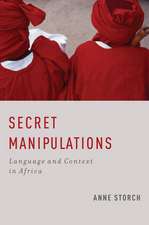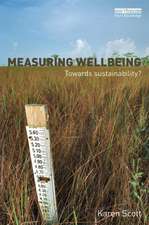Producing Spoilers: Peacemaking and the Production of Enmity in a Secular Age
Autor Joyce Dalsheimen Limba Engleză Hardback – 21 aug 2014
Preț: 235.70 lei
Preț vechi: 293.23 lei
-20% Nou
Puncte Express: 354
Preț estimativ în valută:
45.11€ • 48.98$ • 37.89£
45.11€ • 48.98$ • 37.89£
Carte tipărită la comandă
Livrare economică 11-17 aprilie
Preluare comenzi: 021 569.72.76
Specificații
ISBN-13: 9780199944422
ISBN-10: 0199944423
Pagini: 256
Dimensiuni: 211 x 142 x 25 mm
Greutate: 0.39 kg
Editura: Oxford University Press
Colecția OUP USA
Locul publicării:New York, United States
ISBN-10: 0199944423
Pagini: 256
Dimensiuni: 211 x 142 x 25 mm
Greutate: 0.39 kg
Editura: Oxford University Press
Colecția OUP USA
Locul publicării:New York, United States
Recenzii
Producing Spoilers is a compelling book, which boldly argues that "recognizing humanity in all its complexity must surely include recognizing the humanity" -- and the political imaginaries -- "even of the [apparently] despicable anachronistic others who live in the past"
Joyce Dalsheim's book is a timely contribution to a deeper understanding of the various and contradictory narratives of Israelis and Palestinians. These are voices and views of great importance for any hoped-for peace, and yet they have been given hardly any voice by the dominant political frameworks of peace processes. Here you will find the sensitive eyes and ears of a cultural anthropologist who provides a much more nuanced reading of all the parties to the conflict. The deeper empathic understanding of these parties and their worldviews is the only hope for short term and long term solutions that involve the least amount of violence and the greatest hope for a realistic path of justice and fairness to all communities affected by this century-old conflict.
This book simultaneously engages and challenges the current fashion for the reification of the enemy à la Carl Schmitt. With a moving synthesis of ethnography and theory, Dalsheim studies the site where the enemy effect is produced, in part through the very rhetoric of conflict resolution. The radical message of her work is that in a true search for peace, no onenot even the most inconvenientmay be left behind.
Nation, narration, recognition these are among the complicated terms that oscillate, rather than mediate, between war and peace. They reach deep into entrenched certainties and familiar divisions. In Israel/Palestine, Dalsheim reminds us, they endure as alibis of failure. Casting and recasting them out of the troubling margins of the so-called conflict (spoilers, settlers, peacemakers, conversation stoppers, and repugnant others), this book seeks nothing less than to move the very ground of our moral imagination.
Joyce Dalsheim's book is a timely contribution to a deeper understanding of the various and contradictory narratives of Israelis and Palestinians. These are voices and views of great importance for any hoped-for peace, and yet they have been given hardly any voice by the dominant political frameworks of peace processes. Here you will find the sensitive eyes and ears of a cultural anthropologist who provides a much more nuanced reading of all the parties to the conflict. The deeper empathic understanding of these parties and their worldviews is the only hope for short term and long term solutions that involve the least amount of violence and the greatest hope for a realistic path of justice and fairness to all communities affected by this century-old conflict.
This book simultaneously engages and challenges the current fashion for the reification of the enemy à la Carl Schmitt. With a moving synthesis of ethnography and theory, Dalsheim studies the site where the enemy effect is produced, in part through the very rhetoric of conflict resolution. The radical message of her work is that in a true search for peace, no onenot even the most inconvenientmay be left behind.
Nation, narration, recognition these are among the complicated terms that oscillate, rather than mediate, between war and peace. They reach deep into entrenched certainties and familiar divisions. In Israel/Palestine, Dalsheim reminds us, they endure as alibis of failure. Casting and recasting them out of the troubling margins of the so-called conflict (spoilers, settlers, peacemakers, conversation stoppers, and repugnant others), this book seeks nothing less than to move the very ground of our moral imagination.
Notă biografică
Joyce Dalsheim is a cultural anthropologist in the Department of Global, International, and Area Studies at the University of North Carolina at Charlotte. She has carried out extensive fieldwork in Israel/Palestine studying controversies over historical narratives, nationalism, religiosity, and secularity. Her previous publications include Unsettling Gaza: Secular Liberalism, Radical Religion, and the Israeli Settlement Project (OUP, 2011). She is the Associate Editor for Israel and Palestine for the Review of Middle East Studies.















